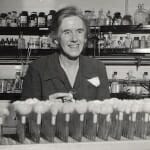Tag History of science
Why do we call it herd immunity?
The term first appeared in a British public health journal in 1923 in reference to bacterial transmission in mice. This study looked at vaccines, and how vaccinating some mice out of a group — or a “herd” — might begin to prevent bacterial transmission between them.
UW’s Elizabeth McCoy was a pioneer of 20th century microbiology
As a woman in a field dominated by men, McCoy rarely received the accolades that her male colleagues did, but by all accounts, she felt welcome at the university and respected by her peers.
Opening the lid on food history
History of science alumna Anna Zeide has earned a James Beard Award for her book on the history of the American food industry through the emergence of commercial canned goods.
150 years ago, periodic table brought order to the chemical universe
"You could say that we take the periodic table (of the elements) for granted," says UW–Madison chemistry instructor Matt Bowman. "But I could not imagine chemistry without it.”
Family tree traces the history of UW’s chemistry department
The current chemistry faculty is linked to the founders of modern chemistry in a 200+ year-old "chemical genealogy" laid out in three posters in the Chemistry Building.
In words and glass, collaboration unlocks birth of modern chemistry
Scientific glassblower Tracy Drier creates a kaliapparat, the focus of his historical research, inside his glass shop in the basement of the UW–Madison…
Two from UW–Madison among 2017 Carnegie Fellows
Gregg Mitman and Greg Nemet are among 35 distinguished scholars, journalists and authors chosen this year. The fellows program boosts scholars in the social sciences and humanities as they research challenges to democracy and international order.
Exhibit explores state of science at time of Darwin’s book
“Science Circa 1859: On the Eve of Darwin’s Origin of Species,” opening Monday, Nov. 23, in the Department of Special Collections at Memorial Library, explores the state of science before Charles Darwin’s groundbreaking book arrived on the scene 150 years ago.
Surgeon returns after five decades to complete elusive bachelor’s degree
Consider the four-year plan, the five-year plan and the not-to-be-forgotten six-year pace to the bachelor's degree, and then get a look at Richard Smith's transcripts.
University names interim director for Nelson Institute
Gregg Mitman, a science historian at UW–Madison, has been named interim director of the university’s Nelson Institute for Environmental Studies.








